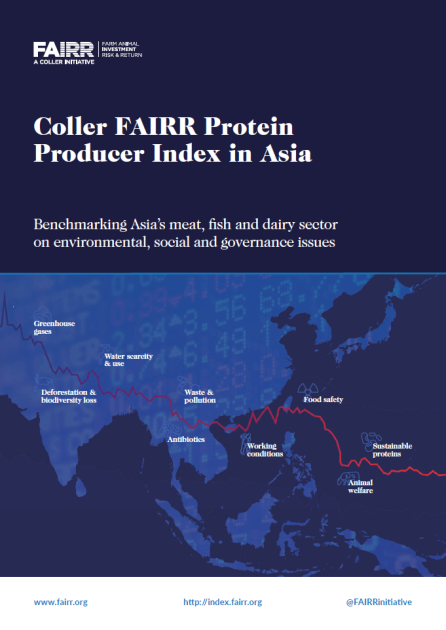Overview
The Coller FAIRR Protein Producer Index is the world’s first comprehensive assessment of how some of the largest (by market capitalisation) global intensive livestock and fish farming companies are managing the sector’s critical environmental, social and governance (ESG) risks. It is primarily a resource for institutional investors and other actors interested in the livestock sector.
The companies selected for the Index are involved in breeding, processing, distributing and selling meat, dairy and/or aquaculture products. The 60 Index companies have a combined market capitalisation of $297 billion (as of 28/03/18). Almost all of the companies’ revenues are derived from producing and processing intensively farmed livestock and fish. Their consolidated revenues cover approximately 20% of the global livestock and aquaculture market and they dominate their regional markets. The 17 Chinese companies in the Index, for example, represent nearly 30% of the Chinese market for animal proteins, including 100% of the domestic dairy market. They also supply some of the world’s biggest food companies, including McDonald’s, Walmart, Nestlé and Danone.
A focus on Asia
This report is a summary of the Index results for the 30 companies based in Asia. They represent 50% of the companies assessed in the full Coller FAIRR Protein Producers Index.
Key Takeaways
Our findings show that nearly all (94%) of the Asian companies in the Index are either not managing critical risks or are failing to disclose basic information.
In general, Asian dairy companies score higher than any other protein category. This differs from the global index where European aquaculture companies lead the sector.
26 Asian companies, worth $120 billion, rank as ‘high risk’ on the overall management of ESG risks.
Even Charoen Pokphand Foods PCL, the highest-scoring firm among the Asian companies, is ranked as ‘medium risk’.
Only four Asian companies score high enough to be considered “medium risk”. These are Charoen Pokphand Foods PCL, China Shengmu Organic Milk Ltd, Vietnam Dairy Products JSC and WH Group Ltd.
Only three Asian companies disclose across all eight scored risk factors (Charoen Pokphand Foods PCL and China Shengmu Organic Milk Ltd).
Antibiotics management is the most poorly addressed risk, in an industry that is the primary global consumer of antibiotics.
No Asian company has a zero deforestation or zero net deforestation target even though rising animal protein consumption is one of the and largest drivers of deforestation and biodiversity loss.
Of the nine risk factors in the Index, Asian companies perform best on waste and pollution. More than a third of companies (37%) are assessed as ‘low risk' and a half (50%) are assessed as ‘medium risk.’
Only two of the 30 Asian companies account for the emergence and growth of the alternative (non-meat) proteins sector. Our Index also seeks to examine the exposure of these companies to opportunities in the alternative protein market, particularly given its rapid growth. The market is expected to reach $5.2 billion by 2020.
Context and Background
Today, intensive livestock production methods are the dominant system of livestock farming. Farmed poultry currently makes up 70% of all birds on the planet, and 60% of all mammals on Earth are livestock, mostly cattle and pigs. This trend is increasing with many Asian countries, including China, consolidating farming operations to reduce fragmentation and increase production efficiencies.
Combine this growth in intensive livestock production with current forecasts for global population rise, increasing urbanisation and a burgeoning middle class that demands more animal protein, and it seems that meat, dairy and aquaculture companies are favourably positioned for capital investment. However, the dramatic expansion of this industry has also exacerbated climate change impacts, water scarcity, food insecurity, human health risks, biodiversity loss and antimicrobial resistance (AMR).
In a resource-constrained world, there is growing recognition of the inefficiencies of meat and dairy production. An analysis found that the production of animal-based foods accounted for more than three-quarters of global agricultural land use and around two-thirds of agriculture’s production-related greenhouse gas emissions in 2009, while only contributing 37% of total protein consumed by people in that year.
Further, the rapid increase in animal protein consumption is leading to human health risks. While this is predominantly a problem in Western markets, a diet heavy in processed animal proteins is increasingly an issue for emerging markets. Consumption of meat products in East Asia has increased by more than 500% over the last 50 years. The FAO has warned that increasing demand for, and consumption of, meat and other products of animal origin in East and Southeast Asia will threaten the health of millions of people and livestock.
Results by Indicator
GHG emissions
Only one company, Charoen Pokphand Foods PCL, qualifies as low risk. Companies primarily report on their energy consumption and some key emissions (nitrogen oxides or sulphur dioxide), as required by state or national laws. Only two companies – Charoen Pokphand Foods PCL and NH Foods Ltd – report on their GHG emissions inventory (Scope 1 & Scope 2), but with limited detail. They are also the only companies with partial emission reduction targets. Encouragingly, Charoen Pokphand Foods PCL and Vietnam Dairy Products JSC have both managed to achieve a reduction in emission intensity (not solely due to revenue).
Deforestation and biodiversity
Asian companies do not address deforestation or biodiversity issues actively. No company has a zero deforestation or zero net deforestation target. While most companies may not have direct deforestation risks, they are exposed to these risks in their feed supply chains. Only two companies have a supplier code, albeit a weak one. No aquaculture company has a policy or strategy in place to manage escapees from fish farms.
Water scarcity
Nearly 50% of companies report on water use management, though freshwater consumption is reported by only a few companies. One of these is Beijing Sanyuan, a vertically integrated dairy company. The company reports on freshwater use as well as detailing its water recycling initiatives. The majority of water footprint occurs in feed production – in general, this is an issue that is barely addressed by intensive farming companies, including those in Asia. Vietnam Dairy Products JSC is the only company with a relevant target. Charoen Pokphand Foods PCL is the only company with any specific requirements for suppliers on water use and management.
Waste and water pollution
This is the best performing risk factor for Asian companies. On average Asian companies outperform the average performance of companies from other regions. Over 50% of Asian companies reference manure and manure management – possibly a consequence of regulatory intervention. In contrast, no North American company in our Index mentions manure management. An example of reporting is from Inner Mongolia Yili, which has installed rainwater and sewage diversion systems as well as manure drying systems to ensure zero discharge of manure and sewage. These systems allow water and waste to be recycled and reused as resources for the farms. However no aquaculture company has a waste management strategy.
Antibiotics
Few companies mention antibiotics or animal drugs. One company, China Shengmu Organic Milk Ltd, has a policy addressing no routine use while another (Charoen Pokphand Foods PCL) has a policy addressing only routine use of medically important antibiotics. The average score for the risk factor is below one.
Animal welfare
While awareness of farm animal welfare is increasing, the concept remains relatively new in China. Most companies do not address animal welfare beyond a husbandry perspective. QAF Ltd is the only company with a comprehensive animal welfare policy. It is the top performer for this risk factor in the global Index. QAF Ltd’s farms are however located in Australia.
Working conditions
Only three companies reference long term injury rates (with two reporting that none had occurred). Two companies have a policy that specifically calls out the four safe and fair working conditions: (a) freely chosen employment; (b) no child labour; (c) health and safety training; and (d) no discrimination. Child labour and discrimination are generally not mentioned, nor is a freely available policy on the freedom for employees to form worker’s associations. In the global Index, only 10 meat companies are assessed as “low risk” in this risk indicator. Charoen Pokphand Foods PCL is one of them.
Food safety
Food safety is a key concern for the Asian food industry, given the number of scandals in recent years, especially in China. Not surprisingly, most companies address the issue, and 11 companies report full traceability systems. However, transparency remains an issue. While 10 companies disclose food recalls, only two companies disclose the number of their food recalls and their food recall management process in detail – Charoen Pokphand Foods PCL and Inner Mongolia Yili, which is also the top performers in this category.

